
-
 'Rust' to premiere three years after on-set shooting
'Rust' to premiere three years after on-set shooting
-
Strike at French cognac maker Hennessy over measures in China spat

-
 Xi, Lula meet in Brasilia to 'enhance ties'
Xi, Lula meet in Brasilia to 'enhance ties'
-
SpaceX fails to repeat Starship booster catch, as Trump watches on
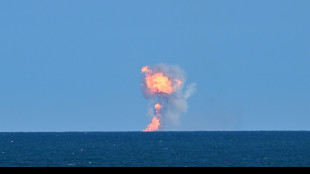
-
 'I have left a legacy': Nadal retires from tennis
'I have left a legacy': Nadal retires from tennis
-
US recognizes Venezuela opposition's Gonzalez Urrutia as 'president-elect'

-
 European powers, US seek to censure Iran at UN nuclear watchdog board
European powers, US seek to censure Iran at UN nuclear watchdog board
-
UNAIDS chief says husband, Ugandan opposition figure Besigye, 'kidnapped'

-
 Nadal's sensational career ends as Netherlands defeat Spain in Davis Cup
Nadal's sensational career ends as Netherlands defeat Spain in Davis Cup
-
US announces talks with Israel over civilian casualties in Gaza

-
 SpaceX fails to repeat Starship booster catch, as Trump looks on
SpaceX fails to repeat Starship booster catch, as Trump looks on
-
G20 summit ends with Ukraine blame game

-
 Trump appoints TV celebrity 'Dr. Oz' to key US health post
Trump appoints TV celebrity 'Dr. Oz' to key US health post
-
European stocks fall on Ukraine-Russia fears, US focused on earnings

-
 Last-gasp Szoboszlai penalty rescues Hungary draw with Germany
Last-gasp Szoboszlai penalty rescues Hungary draw with Germany
-
Germany, Netherlands draw as Nations League group stage ends

-
 Hong Kong tycoon Jimmy Lai takes witness stand in collusion trial
Hong Kong tycoon Jimmy Lai takes witness stand in collusion trial
-
Guardiola set to extend stay as Man City boss - reports

-
 Minnows Botswana hold Egypt to qualify with Mozambique, Tanzania
Minnows Botswana hold Egypt to qualify with Mozambique, Tanzania
-
Inter Miami coach Martino leaving club for 'personal reasons' - club source

-
 Chinese man sentenced to 20 months for Falun Gong harassment in US
Chinese man sentenced to 20 months for Falun Gong harassment in US
-
Hong Kong court jails 45 democracy campaigners, drawing condemnation

-
 'I did it for Rafa': Alcaraz after keeping Spain Davis Cup dream alive
'I did it for Rafa': Alcaraz after keeping Spain Davis Cup dream alive
-
Alcaraz keeps Spain and Nadal Davis Cup dream alive

-
 Trump names China hawk Howard Lutnick commerce secretary
Trump names China hawk Howard Lutnick commerce secretary
-
Europe's pivotal role in bid to strike COP29 climate deal
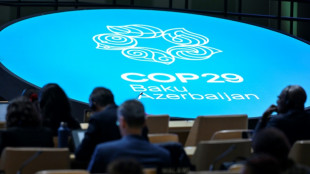
-
 MotoGP champion Martin falls on Aprilia debut
MotoGP champion Martin falls on Aprilia debut
-
Bodies burned after Haiti police, civilians kill 28 alleged gang members

-
 'Probably my last match': Nadal after Davis Cup singles defeat
'Probably my last match': Nadal after Davis Cup singles defeat
-
Iran faces new censure over lack of cooperation at UN nuclear meeting

-
 Afghan woman teacher, jailed Tajik lawyer share top rights prize
Afghan woman teacher, jailed Tajik lawyer share top rights prize
-
Pressure mounts on Scholz over bid for second term

-
 Take two: Biden makes it into G20 leaders' photo
Take two: Biden makes it into G20 leaders' photo
-
Russia vows response after Ukraine fires long-range US missiles

-
 Spain's Nadal loses in Davis Cup quarter-finals singles opener
Spain's Nadal loses in Davis Cup quarter-finals singles opener
-
Four elite Brazil officers arrested over alleged 2022 Lula murder plot

-
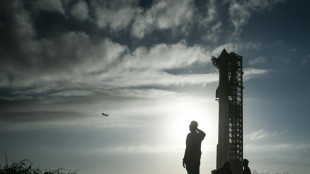 SpaceX set for Starship's next flight -- with Trump watching
SpaceX set for Starship's next flight -- with Trump watching
-
Trump ally seeks to block trans lawmaker from women's restrooms

-
 Slovakia oust Britain to meet Italy in BJK Cup title match
Slovakia oust Britain to meet Italy in BJK Cup title match
-
Top-selling daily French daily Ouest-France stops posting on X

-
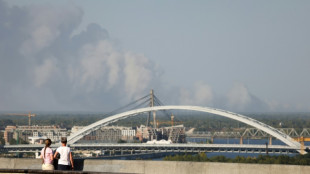 Russian invasion toll on environment $71 billion, Ukraine says
Russian invasion toll on environment $71 billion, Ukraine says
-
'Sabotage' suspected after two Baltic Sea cables cut

-
 'You will die in lies!': daughter clashes with father at French rape trial
'You will die in lies!': daughter clashes with father at French rape trial
-
Spain Women drop veterans Paredes and World Cup kiss victim Hermoso

-
 Stocks diverge on fears of Ukraine-Russia escalation
Stocks diverge on fears of Ukraine-Russia escalation
-
New Botswana leader eyes cannabis, sunshine to lift economy

-
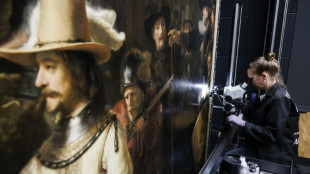 'Operation Night Watch': Rembrandt classic gets makeover
'Operation Night Watch': Rembrandt classic gets makeover
-
Haiti police, civilians kill 28 gang members: authorities

-
 Taxing the richest: what the G20 decided
Taxing the richest: what the G20 decided
-
'Minecraft' to come to life in UK and US under theme park deal


There will be accountability for Ukraine crimes, eventually: expert
Shocking images of bodies strewn in Ukrainian streets clearly indicate war crimes, but legally proving that and ensuring accountability is tricky, according to a top international justice expert.
The calls for war crimes investigations and trials over Moscow's conflict in Ukraine have intensified after horrific photographs emerged of corpses in roads and in mass graves in Bucha, near Kyiv, after Russian troops retreated from the devastated town.
The Kremlin has denied responsibility and suggested the images are fake or that the deaths occurred after Russian forces pulled out of the area.
Philip Grant, who heads the TRIAL International NGO that works to ensure accountability for international crimes, said that, while powerful, such images alone cannot legally prove war crimes have occurred and who is responsible.
"Images in themselves rarely count as the defining evidence," he told AFP in an interview.
"They can reveal important elements, but they will not reveal the full story," he said.
Grant said it was important to be "cautious" when interpreting events, pointing to past examples of manipulation and misinterpretation.
There was, for instance, the dramatic misreporting that a massacre occurred during the 1989 Timisoara uprising in Romania, and Soviet efforts during the Nuremberg trials to pin its own 1940 Katyn massacre of Polish officers on Nazi Germany.
- 'Clear-cut' -
At the same time, Grant said, investigators should "exercise sound judgement" with what they can see.
In the case of the Bucha images, "it looks pretty clear-cut that war crimes have been committed," he said.
But the images alone do not make it possible to "attribute that responsibility to a specific person or to a specific group."
Even if it was determined that "Russians did it," he said, "that's not accountability. We need to know who ordered that."
"Is it (Russian President) Vladimir Putin? Is it the commander on the ground? Is it a rogue unit?"
"In terms of criminal liability," he said, "it's too early to say who should end up in court for those crimes."
That process can be long and complicated, he acknowledged.
As the International Criminal Court, the UN Human Rights Council and a growing number of countries begin sending war crimes investigators to Ukraine, they will have their work cut out for them, Grant said.
- Is it a crime? -
The first step is to "make sure you have a crime".
"It might look obvious, but it's not always," he said, pointing out that in war, unlike in civilian life, killing people can be lawful.
A soldier killed in battle is not considered a crime, but if that soldier is killed after being wounded or taken prisoner, it is.
And if you find a mass grave with soldiers killed in combat, "that is not a crime," Grant said.
But "if you find in the mass grave a family, civilians, that is probably a crime."
After determining a crime has been committed comes the even more complicated task of figuring out who is legally responsible.
With war crimes, you can have "many circles" of accountability, Grant said, from the perpetrator, to superiors who may have ordered the crime, or failed to exercise control over soldiers involved.
- Top-level liability -
"The levels go all the way up to the top," he said.
In cases where evidence points to top-level criminal liability, the main challenge is "getting access to the suspects," Grant said.
If the Ukraine investigations "point to criminal responsibility of Putin, you would need to put your hands on the person."
"That's not going to be something easy," he said, but "it is possible."
Importantly, there is no statute of limitation for war crimes.
Those involved could be held accountable even decades after the fact, as with former concentration camp guards and officials still being put on trial for crimes committed during World War II.
Grant said for Ukraine, even lower-level commanders and civilian authorities "could be liable for crimes committed for a long time to come."
"Putin is 69," he pointed out. "That leaves a little bit of room, but there are others."
"There are probably hundreds of people in the security apparatus who could at some point be held accountable, not even talking about the field soldiers."
L.Adams--AT
